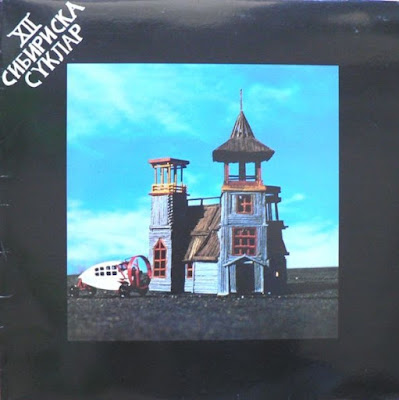Lars Hollmer
1981
XII Sibiriska Cyklar
01. Avlägsen Strandvals (2:39)
02. Piano de Jugugte (2:40)
03. Hajar du Idealfamiljen? (1:36)
04. Endlich ein Zamba (2:36)
05. Inga Pengar (2:25)
06. Kameisväng (3:11)
07. Ja Änte Flöttar Ja Te Sjöss (1:35)
08. Boeves Psalm (2:30)
09. Jag Väntar På Pelle (2:44)
10. Bluesen (2:05)
11. 44 Sekunder Köpt Speldosa (0:45)
12. Ung Harald (2:43)
13. Litet Piano (2:28)
- Lars Hollmer / accordion, keyboards, drums & percussion, vocals, everything else
The title XII sibiriska cyklar allude to the story about the Siberian farmer, who was living so dreadfully far away from everything and everybody, that he spent most of his time walking to his every destination. However, when he at last became tired of these boring time-consuming walks, he sat down and eventually invented a bicycle! Struck with rapture for his ingenious invention, he anxiously straddled his bike and rode into the nearest town. He intend to show and to apply for a patent for his wonderful innovation. When at long last, he reached the town, he shocked to see thousand of bicycles zooming along in the drizzle. Under the grey skies, he then suddenly dies of a heart attack. I don't believe there is a any truth to this story, even though it is worth considering... Anyway I have stolen it from Hasse...
All songs on XII sibiriska cyklar are created by Lars Hollmer, except the lyrics of "Ung Harald" which was written by Dan Andersson and performed by Tomas Ladberg.
XII sibiriska cyklar was recorded in the Chickenhouse outside Uppsala, on Teac 8 track recorder, in June through October 1980 and in March 1981. "Kamelsväng" is a home recording from 1975 and "litet Piano" was recorded on a cassete recorder in 1976. The final mix was made on one hot day and night by Anders Lind and Lars Hollmer in the MNW Studio, in April 1981, and later in the Chickenhouse by Lars Hollmer.
Lars Hollmer’s first solo album, most of which was recorded at his Chickenhouse studio in June through October 1980 and March 1981 on an eight-track tape deck, is an amiable, fractured, and sometimes downright wacky endeavor that might have lacked a bit of cohesion but nevertheless signaled the emergence of a great composer, even if that last assertion is based upon a single two-and-a-half-minute track, the timeless “Boeves Psalm.” Overall, XII Sibiriska Cyklar (named after the fable of a Siberian bicycle inventor) might have taken some fans of Samla Mammas Manna/Zamla Mammaz Manna, Hollmer’s Rock in Opposition outfit of the preceding decade, a bit by surprise -- they might not have known that Hollmer had begun playing accordion with the world/folk ensemble Ramlösa Kvällar in the late ‘70s and had grown quite fond of the instrument. So here, after Lars had become perhaps best known as a prog rock-ish electric keyboardist, he settled in alone at the Chickenhouse, happily strapped to a squeezebox (with other instruments and non-instruments within reach), ready to tackle a few folky forms -- waltzes, polskas, and the like -- and imbue them with his singular persona. As Hollmer listeners over nearly the next three decades would learn, the Swede could tackle nearly any genre and make it his own -- and it all started here.
He waltzes through the opening beer-hall singalong “Avlagsen Strandvals,” contributing falsetto choruses and whistling; the manic “Jajar du Idealfamiljen?,” in perhaps a twisted polska form, includes more crazed Samla-esque vocalizing, from an exaggeratedly robust tenor to choruses in more cartoonish falsetto; his accordion mimics a train whistle over the insistent keyboard-and-percussion rhythm of “Endlich Ein Zamba”; and, like any Scandinavian folk artist worth his salt, he navigates the tricky time signature of “Ja Änte Flöttar Ja Te Sjöss,” another singalong number, with both precision and infectious high spirits. Hollmer’s experimental side was not kept entirely in check, however, as “Kamelsväng,” with its burning synthesizer tone and wordless interjections, wouldn’t be out of place on a disc of early Soft Machine outtakes (a good outtake, but an outtake nonetheless); an uncharacteristically vehement spoken word interlude, “Bluesen,” features more of that fuzzed-up synth sound; and the final number, “Litet Piano” (recorded on cassette in 1976), ends the album on an understated note. Here and there throughout, Lars incorporates assorted household percussion, a music box, and bells, hinting at the magic of his recordings to come.
But yes, “Boeves Psalm” is here for the first time, and it would remain Lars Hollmer’s best-known piece throughout his life, performed by accordion soloists and ensembles, rock bands, big bands, chamber musicians, and even symphony orchestras. Written several years previously in homage to a deceased uncle, the piece has a beautiful melody simply repeated three times in its AABA form on the accordion, embellished as it proceeds with additional instrumentation, including harpsichord-like keyboard arpeggios and finally bells, building in power but nonetheless retaining its inescapable charm. On this version recorded by Lars alone, the adornments are relatively few -- this is a tune that can handle all manner of counter-melodies and in one symphonic rendition even concludes with a few bars of The Hallelujah Chorus! -- but its simplicity and heartfelt emotion, not to mention the fact that its composer is putting it on tape for the first time here, make it a beautiful and wistful listening experience. [In 1994 the Resource label released XII Sibiriska Cyklar and Lars Hollmer’s second LP, 1982’s Vill du Höra Mer, on a single-disc CD compilation.]

ReplyDeletehttp://www.filefactory.com/file/3ren9pdc1ue6/8578.rar